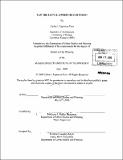Can the LCCU & 1199SEIU be partners?
Author(s)
Espinoza-Toro, Carlos J. (Carlos Javier)
DownloadFull printable version (3.613Mb)
Alternative title
Can the Latino Community Credit Union & United Health Care Workers East be partners?
Other Contributors
Massachusetts Institute of Technology. Dept. of Urban Studies and Planning.
Advisor
J. Phillip Thompson.
Terms of use
Metadata
Show full item recordAbstract
This thesis explores how organizations competent at harnessing the collective power of low-income immigrants might successfully combine their strategies to advance the well-being of their mutual constituencies. Based in Durham, North Carolina, the LCCU is a successful community development credit union that delivers financial products and financial education programs to a fast growing low-income Latino community. Based in New York City, New York, 1199SEIU is a successful local labor union that organizes low-income workers to negotiate fair wages and benefits. The LCCU and 1199SEIU represent two dissimilar models of harnessing collective power in different geographic areas in the U.S. Yet, an in-depth analysis at the history of these organizations finds certain elements of common ground upon which they could base a potential partnership. The LCCU and 1199SEIU serve a mutual constituency of low-income immigrants and share the mutual goal of improving their lives. Furthermore, an analysis of their unique competences exposes complementary sets of skills and resources. Given the existence of common ground and a subsequent interest from each organization in exploring a potential partnership, this thesis attempts to answer the following question: Can the LCCU and 1199SEIU be partners? This thesis argues that the LCCU and 1199SEIU can generate synergistic possibilities of collaboration by combining their unique competences to pursue mutual interests. However, this synergy also exposes challenges to the implementation of such possibilities. This thesis concludes by recommending a series of next steps for the LCCU and 1199SEIU to follow in order to overcome these challenges and make their potential partnership a reality.
Description
Thesis (M.C.P.)--Massachusetts Institute of Technology, Dept. of Urban Studies and Planning, 2008. Includes bibliographical references (leaves 38-40).
Date issued
2008Department
Massachusetts Institute of Technology. Department of Urban Studies and PlanningPublisher
Massachusetts Institute of Technology
Keywords
Urban Studies and Planning.